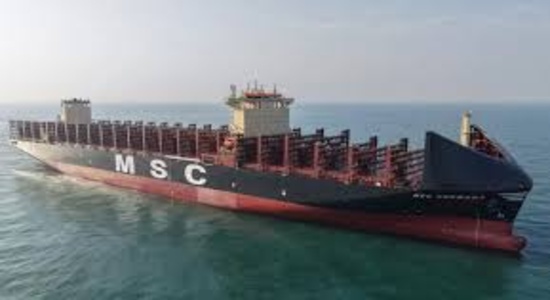
MSC makes History with Fleet of 900 Vessels
GENEVA : The Mediterranean Shipping Company (MSC) has made history by becoming the first global container carrier to operate a fleet of 900 vessels. This remarkable milestone was celebrated with the delivery of the LNG-powered MSC GERMANY, a state-of-the-art 16,000 TEU “maxi-neo-panamax” containership. The MSC GERMANY is the fifth unit in a series of twelve sister ships ordered from a Chinese shipyard in October 2022, marking a significant achievement for the company.
According to Alphaliner, a leading liner industry analyst, MSC’s current fleet comprises 609 owned vessels and 291 chartered ships. This extensive fleet allows MSC to maintain a total capacity of approximately 6.47 million TEU, which puts them nearly one million TEU slots ahead of their closest competitor, Maersk. The company’s ambitious growth strategy could see its fleet expand to 1,000 ships in the coming years, with 132 vessels currently on firm order.
The liner industry analyst reports that MSC’s milestone achievement was marked by the delivery of the LNG-powered MSC GERMANY, a 16,000 TEU “maxi-neo-panamax” containership. This newest addition represents the fifth unit in a series of twelve sister ships ordered from a Chinese shipyard in October 2022.
Looking ahead, MSC’s fleet could potentially expand to 1,000 ships in the coming years, with 132 vessels currently on firm order.
The MSC GERMANY’s delivery comes at a time when the container shipping market is experiencing unprecedented volatility, often referred to as “tariff madness.” Industry experts predict that this chaotic environment will lead to a wave of renegotiations for ocean shipping contracts, as companies grapple with fluctuating rates and minimum quantity requirements. The situation is further complicated by the ongoing challenges in global supply chains, which have been exacerbated by the COVID-19 pandemic and geopolitical tensions.
MSC’s fleet expansion is not just about numbers; it reflects the company’s strategic vision to enhance its operational capabilities and improve service delivery amid rising demand for shipping services. The MSC Group, which also includes subsidiaries like Medlog, Log-In Logistica, and WEC Lines, has positioned itself as a dominant player in the shipping industry. With the addition of the MSC GERMANY, the company solidifies its leadership in the global container shipping market.
Alphaliner’s fleet calculations include vessels under ‘quasi-owned’ arrangements, such as long-term bareboat charters with purchase obligations, provided these ships are managed in-house by MSC.
